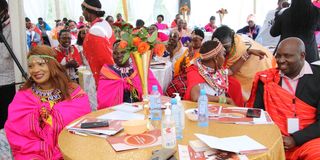Women say negotiated democracy denying them right to vie

Delegates attending the seventh National Indigenous Women Conference at Anka rResort in Nyeri County.
Indigenous women have faulted negotiated democracy in some regions, saying it denies them their right to vie for elective positions.
The women representatives from 16 indigenous communities noted that their patriarchal societies continue to deny them leadership positions that are considered a preserve of men, except for woman representative seats and nomination slots.
“In our society, men dominate and negotiate seats for various elective representatives whether for gubernatorial, senatorial, MPs and members of the county assembly and later ask the women to take the women representative seat as it is provided in the Constitution,” said Ms Jane Meriwas, executive director of the Samburu Women Trust (SWT).

Delegates attend the seventh National Indigenous Women Conference at Anka resort in Nyeri county on July 12, 2022. The meeting brought together over 200 participants from various organizations and groups in the country. The theme of the conference is ‘Enhancing indigenous women meaningful participation in politics, land and natural resources decision-making processes’ and was convened by Samburu Women Trust. National Gender and Equality Commission CEO Betty Sungura graced the meeting.
Ms Meriwas spoke during the opening of the seventh Annual Indigenous Women Conference being held at a Nyeri hotel. It is jointly organised by SWT, Defenders Coalition and Trust for Indigenous Culture And Health (TICAH).
The two-day conference will discuss indigenous women’s inclusion and participation in land ownership, control and management and accelerate strategies to enhance capacity in land governance.
It also seeks to enhance collaboration among indigenous women to spearhead initiatives that seek to politically empower them and promote their inclusion in key decision-making processes.
The meeting comes as Kenya is gearing up for the August 9 General Election.

Delegates attending the seventh National Indigenous Women Conference at Anka resort in Nyeri County on July 12, 2022. The meeting brought together over 200 participants from various organizations and groups in the country.
“I am wondering why nominated women are referred to as ‘flower girls’ in Parliament and county assemblies, while their male nominated counterparts are called parliamentarians whereas they are playing the same role in the assemblies,” posed Ms Meriwas.
It is time for Kenyans to elect leaders who will fight for their rights for the next five years without oppressing them, said Ms Li Fung, a senior human rights adviser with the office of the United Nations High Commissioner on Human Rights.
“[Women] should stand and elect representatives who will stand up for their rights, either property ownership, education or give them power to hold managerial positions in the society,” she said.
The government, said Defenders Coalition Executive Director Kamau Ngugi, should ensure that documented historical land injustices are addressed and priorities given to indigenous communities in Kenya that have lost huge chunks of land to grabbers.

Delegates attending the seventh National Indigenous Women Conference at Anka Resort.
Mr Kamau called on the government to establish a ministry for pastoralists and indigenous people to oversee friendly policies in education, health, affirmative action and social-cultural development and other community resilience programmes and activities.
Betty Sungura, CEO of the Gender and Equality Commission, announced that the agency would form a working alliance with community-based organisations to pursue a common goal of advancing human and women’s rights and work on complaints brought to it.
Notable communities represented include the Ogiek, Segwer, Ilchamus, Pokot, Samburu, Maasai, Elmolo, Eldorois, Oromo, Somali, Yiaku, Watta, Rendile and Turkana.





